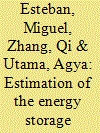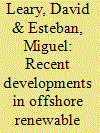|
|
|
Sort Order |
|
|
|
Items / Page
|
|
|
|
|
|
|
| Srl | Item |
| 1 |
ID:
171364


|
|
|
|
|
| Summary/Abstract |
Realizing the full potential of a smart grid is contingent on the residential users’ acceptance of new technologies and the behavioural changes that will follow their implementation. Thus, the present research attempted to gain an insight into the factors that drive residential electricity consumers, particularly those with low income, towards or away from demand side management and distributed energy resources. The results of a consumer survey of 207 Japanese households revealed that there is a clear correlation between low-household income and the willingness of the respondents to reduce their energy expenditures. In contrast, the fear of the perceived additional cost required to implement these technologies, and the belief that consumers have inadequate information or support from the utility company, prevents them from adopting new technologies. Further, the results of a comparative analysis indicate that the reputation of the utility company is higher among smart grid users than traditional electricity consumers. The K-means clustering algorithm and hierarchical cluster analysis indicated that younger and poorer members of the society faced more barriers than middle age wealthier groups. The authors maintain that the electricity utilities thus need to develop a range of measures to engage residential consumers with heterogeneous socio-economic characteristics.
|
|
|
|
|
|
|
|
|
|
|
|
|
|
|
|
| 2 |
ID:
112234


|
|
|
|
|
| Publication |
2012.
|
| Summary/Abstract |
Global warming is likely to profoundly influence future weather patterns, and one consequence of this is the likelihood of an increase in tropical cyclone intensity. The present paper presents a cost-benefit analysis of introducing significant amounts of green energy in the electricity system in Japan in the light of the economic damage that an increase in tropical cyclone intensity could have on GDP growth between 2010 and 2085. Essentially the passage of a tropical cyclone will result not only in physical damage but also on a decrease in economic productivity due to precautionary cessation of the economic activity, which has an effect on GDP growth. By comparing the economic performance of different electricity system scenarios with the indirect economic damage of tropical cyclones from 2010 to 2085, based on the yearly economic data of green electricity, fossil fuel, GDP and population, it can be seen that the green scenarios are generally a cost-effective way of mitigating the effects of these weather systems, despite the large amount of initial investments necessary.
|
|
|
|
|
|
|
|
|
|
|
|
|
|
|
|
| 3 |
ID:
114287


|
|
|
|
|
| Publication |
2012.
|
| Summary/Abstract |
Renewable energy systems are often criticized because of their intermittency and need for substantial amount of backup in terms of other energy sources or storage. The present paper proposes a method to estimate the required amount of storage backup for a mostly solar and wind system that uses also biomass and hydroenergy as minor components of the electricity mix. An hourly simulation was carried out to determine the amount of electricity that could be produced based on the meteorological conditions of year 2001 in Japan, and this was compared with the maximum electricity demands imposed in the system for each month of the year. The system thus proposed has 100% chance of meeting around 40% of the electricity demand between 11:00 and 18:00, and the optimum scenario obtained (a 2:1 mix of solar to wind energy) required around 40 TW of storage to balance the extra electricity demand that occurs during the summer in Japan. It appears unlikely that the batteries in EV in vehicles will be able to meet this storage requirement in the future, though the system is able to adequately meet the electricity demand during the majority of the year, and hence showcases the viability of renewable energy.
|
|
|
|
|
|
|
|
|
|
|
|
|
|
|
|
| 4 |
ID:
103451


|
|
|
|
|
| Publication |
2011.
|
| Summary/Abstract |
For the case of the UK there are currently three ways of obtaining energy from sea areas, namely from wind, tides and waves. A methodology was developed to determine the future size of the offshore renewable industry based on the concept of employment factor, or the number of people required to maintain each unit of electricity production. An assessment was made of the decline in the number of people employed in oil related jobs in the North Sea and the gap that this could create in the UK's economy unless this pool of offshore expertise could find an alternative employment in the renewable sector. The paper will also investigate the effect of gradually transforming the UK's oil and gas sector into offshore renewables. If this was to happen by 2050 the UK offshore renewable industry could produce between 127 and 146 TWh of electricity, equivalent to around 57-66% of the current energy consumption in the country.
|
|
|
|
|
|
|
|
|
|
|
|
|
|
|
|
| 5 |
ID:
101498


|
|
|
|
|
| Publication |
2010.
|
| Summary/Abstract |
The potentially damaging effects of climate change make it imperative to develop zero-carbon energy systems and societies based on renewable energy sources that do not negatively affect the environment. However, these systems are often criticized for their intermittency, and the present paper proposes a method to analyze the true minimum capacity factor that can be expected from such a system based on a historical hourly estimation of the electricity produced by a given solar-wind generating mix. A simulation was carried out to show how much energy could be produced for a sample future group of scenarios encompassing a variety of solar and wind mixes, and the results show that, with a 1:2 mix of solar to wind energy, the system will always operate at least at 10% capacity from 10:00 to 16:00, as calculated using the meteorological conditions of the year 2001. This study also analyzes the land requirements necessary to implement such a solar-wind energy system, highlighting the vast areas that would be necessary to be covered with wind turbines and solar panels if such a system were to supply the majority of the electricity demand in Japan.
|
|
|
|
|
|
|
|
|
|
|
|
|
|
|
|
| 6 |
ID:
104174


|
|
|
|
|
| Publication |
2011.
|
| Summary/Abstract |
This article examines the emergence of offshore renewable energy (i.e., offshore wind, ocean, and tidal energy) in the Asia-Pacific region with a particular focus on developments in China, South Korea, Australia, and New Zealand. It outlines plans for the development of offshore wind, tidal, and wave energy projects as well as emerging legal and policy measures supporting the growth of offshore renewable energy in the region. The article highlights that, although some progress has been made on laws and other measures to facilitate offshore renewable energy in the Asia-Pacific region, clear regulatory frameworks are still emerging in these jurisdictions.
|
|
|
|
|
|
|
|
|
|
|
|
|
|
|
|
|
|
|
|
|